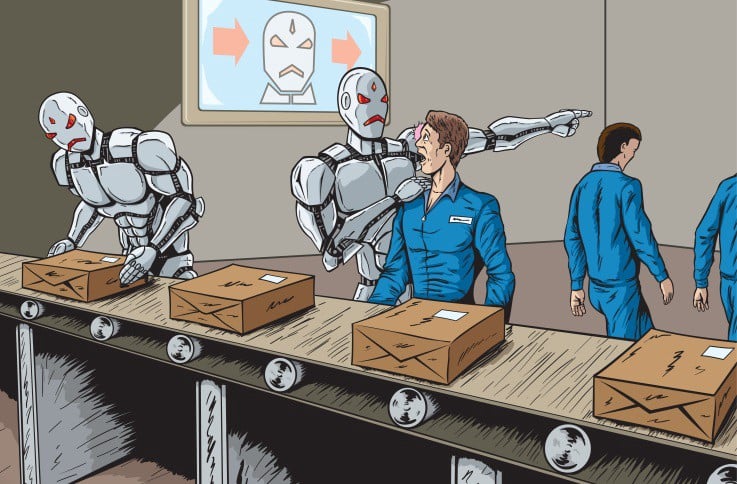“AI: A Transformation of the Economy, with Unforeseen Consequences”
Introduction
Artificial Intelligence (AI) has the potential to revolutionize the economy and the labor market. AI-driven automation and advanced analytics are already transforming the way goods and services are produced and consumed, leading to increased efficiency, productivity, and innovation. However, the increased use of AI can also lead to job displacement and economic inequality, as some jobs are replaced by automation and others become more specialized and require more advanced skills. This is why it is important to understand the potential implications of AI on the labor market and the economy, and to develop strategies to minimize potential negative outcomes and maximize the potential benefits of this technology.
How Will AI Disrupt the Current Job Market and Economy?
The advent of artificial intelligence (AI) has the potential to disrupt the current job market and economy in several ways. Firstly, AI is capable of performing a variety of tasks faster and more efficiently than humans, which could lead to increased automation and decreased need for manual labor. This could lead to job losses in certain sectors, such as manufacturing and transportation, as well as decreased wages for workers. Additionally, AI can also be used to automate administrative processes, such as customer service and data entry, which could lead to further job losses.
Secondly, AI can be used to make decisions more quickly and accurately than humans, which could lead to increased productivity and efficiency. This could increase competition in the job market, making it more difficult for workers to find employment, and could lead to decreased wages as employers become more cost-conscious. AI could also lead to changes in the types of skills employers are looking for, as they may prioritize technical skills over interpersonal ones.
Finally, AI could also have an impact on the economy by increasing the number of products and services available to consumers. This could lead to increased consumer spending, which could in turn lead to economic growth. However, this increased spending could also lead to inflation, which could make it more difficult for people to purchase goods and services.
Overall, AI has the potential to significantly disrupt the current job market and economy. It could lead to job losses, decreased wages, increased competition, and changes in the types of skills employers are looking for. Additionally, it could lead to economic growth and increased consumer spending, but also to inflation. As such, it is important to consider the implications of AI carefully before implementing it in the job market and economy.
How Will AI Help Create New and Better Jobs?
Artificial Intelligence (AI) has the potential to significantly impact our job market, both in terms of creating new opportunities and improving existing roles. AI can help automate mundane and repetitive tasks, freeing up time for more creative and meaningful roles. It can also help to identify and explore opportunities which would have previously been difficult to uncover.
AI can help create new roles with a focus on areas such as data analysis, machine learning, and automation. These roles will require a combination of both technical and emotional intelligence, as well as a deep understanding of the core business and customer needs. By leveraging AI, businesses can leverage data-driven insights to create more efficient and effective processes, ultimately leading to more meaningful job opportunities.
AI can also help to enhance existing roles. For example, it can be used to automate mundane tasks, allowing professionals to focus more on complex problem solving and creative tasks. AI can also help to identify potential areas of improvement, allowing professionals to focus their efforts on value-adding activities.
Overall, AI presents both an opportunity and a challenge for the job market. By capitalizing on AI’s potential to automate mundane and repetitive tasks, create more efficient and effective processes, and uncover new opportunities, businesses can create new and better jobs for their workforce.
What Are the Potential Pros and Cons of Automation?
The potential pros and cons of automation are complex and far-reaching. On the positive side, automation can increase productivity and efficiency, reduce costs and errors, and increase safety. It can also cut labour costs, reduce waste, and improve customer service. On the downside, it can lead to job losses, increased risk of cyber-security threats, and the potential for unethical uses.
One of the primary advantages of automation is its ability to increase productivity and efficiency. By automating repetitive tasks, companies can streamline processes and reduce their costs. Automation can also reduce errors, improve customer service, and increase safety. Automated systems can be designed to detect and respond to potential risks faster than humans, reducing the potential for accidents and injuries.
However, automation can also lead to a reduction in the need for human workers. This can result in a loss of jobs, as well as increased inequality as those with lower wages and fewer qualifications are most likely to be affected. In addition, automation can lead to an increased risk of cyber-security threats, as automated systems can be vulnerable to malicious hackers. Finally, there is the potential for automation to be used for unethical purposes, such as manipulating markets or collecting personal data without consent.
Overall, the potential pros and cons of automation are complex and must be carefully considered. While it can increase productivity and efficiency, reduce costs and errors, and increase safety, it can also lead to job losses, increased risk of cyber-security threats, and the potential for unethical uses. Companies must weigh these pros and cons carefully before deciding whether or not to implement automated systems.
Can AI Help Us Address Income Inequality?
Artificial intelligence (AI) has the potential to be a powerful tool in addressing income inequality. AI can be used to support decision-making processes that are more equitable and transparent. For example, AI can be used to identify patterns of bias in hiring and promotion decisions, helping to reduce disparities in income and wealth. AI can also be used to automate certain tasks, allowing workers to focus on more meaningful work and potentially increase their wages. Additionally, AI can be used to develop better systems for distributing resources and services, helping to ensure that everyone has access to the same opportunities and benefits.
However, AI must be designed and implemented carefully in order to truly make a positive impact on income inequality. For instance, AI systems should not replicate existing biases, but must be designed to reduce them. Additionally, AI must be deployed in ways that are ethical and promote inclusivity, such as by ensuring data privacy and fairness in decision-making. Finally, AI must be used to complement, rather than replace, traditional methods of addressing income inequality, such as investing in public services and education.
In conclusion, AI has the potential to be a powerful tool in addressing income inequality, but this potential can only be realized if AI is carefully designed and implemented. If done correctly, AI can help to reduce disparities in income and wealth and create more equitable systems for distributing resources and services.
What Ethical Considerations Should Be Taken into Account When Developing AI?
When developing Artificial Intelligence (AI), certain ethical considerations must be taken into account in order to ensure the responsible use of this powerful technology. First, AI developers must strive to ensure that their algorithms are free from bias, as any existing prejudice can have far-reaching implications. Furthermore, care should be taken to ensure that AI-driven decisions are transparent, so that affected individuals can understand the reasons for the choices made. Additionally, developers should be aware that AI models can be vulnerable to malicious attacks, and must be designed with security in mind. Finally, developers should be mindful of the potential for AI to cause harm, and must ensure that their algorithms are designed with safety and ethical principles in mind. By taking these considerations into account, AI developers can ensure that their work is responsible and beneficial to society.
What Role Will Governments Play in Regulating AI?
Governments will play a key role in regulating artificial intelligence (AI). As AI technology continues to evolve, governments must ensure that its use is safe, secure, and in line with the public interest. AI is already being used in many aspects of life, from healthcare and education to transportation and finance, and it is expected to become increasingly pervasive in the coming years. Governments must ensure that the regulations they create are able to keep pace with advances in AI technology.
Governments must also ensure that AI is used responsibly and ethically. AI has the potential to be used for malicious purposes, such as manipulating public opinion or conducting cyber-attacks. Governments must ensure that safeguards are in place to prevent this from happening. They must also consider potential ethical implications, such as the lack of privacy that comes with the use of AI or the potential for AI to be used to discriminate against certain groups of people.
Finally, governments must consider the economic implications of AI. AI technology has the potential to disrupt existing markets and create new ones. Governments must ensure that regulations are in place to protect existing businesses from unfair competition and to ensure that new businesses are able to access capital and other resources.
Overall, governments have an important role to play in regulating AI. By creating regulations that are able to keep pace with advances in AI technology, ensure responsible and ethical use, and consider potential economic implications, governments can help ensure that AI is used safely and in the public interest.
Conclusion
AI has the potential to lead to significant changes in the economy and labor market, with profound impacts on the future of work. These changes could lead to job displacement and economic inequality, as those with the skills and resources to take advantage of AI technology will benefit, while those without could suffer. Mitigating these effects and ensuring that everyone has the opportunity to benefit from AI will be a major challenge for governments and policy makers in the years to come.


